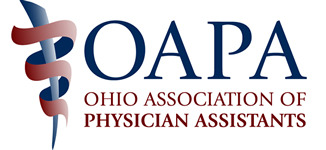Complete Story
10/09/2023
PA Week Spotlight: Amity Arnold, PA-C
Happy PA Week, October 6-12, 2023!
OAPA is celebrating the growth of our PA community as it gets wider and more diverse every year. We cherish the value that PAs bring to the table and recognize the unique contributions each PA makes to health care landscape across Ohio.
Today we feature an interview with Amity Arnold, PA-C, a PA educator at Ashland University.
1. What does PA week mean to you?
PA week is a time to remember those who began our profession and acknowledge the strides we have made as a profession. A time to show our appreciation for our colleagues and fellow PAs.
2. What is your favorite part of being a PA?
I love solving puzzles, and to me every patient is a puzzle asking to be solved. Some simple and some infinitely complex. That’s the beauty of working with the human body and it never
gets old.
3. Do you currently take students or train other PAs?
My primary job is as a faculty member in the Ashland University PA Program. I teach clinical medicine to our didactic year students. I also work clinically in urgent care and take
pre-PA students who are working towards PA school and need shadowing hours.
4. What was your journey like to your current position?
My undergraduate (sports medicine) mentor told me I would make a great teacher and stuck me in an intro to education class which included a stint in a 6 th grade classroom – not for me.
But it always stuck with me that maybe one day I would like to teach in a PA program. A few years back Ashland University opened up a program in my backyard and I knew this was the
time and opportunity to make the jump from clinical practice to PA education.
5. Why do you love your current work in PA education?
I love PA education because after 25+ years as a PA it has given me two things. The first is the chance to give back to my profession and to give forward to the next generation of PAs. The second is that PA education is such a great challenge. It will make you look at the practice of medicine in ways you either took for granted or never stopped to take the time to really dig deep and think about. These students are bright, inquisitive, and full of insightful contemplations.
6. How does working in PA education improve patient care?
I keep coming back to the saying “When one teaches, two learn.” I think this is true whether we teach at a PA program, precept students, or simply allow a prospective student to shadow us. My students force me to stay up to date and on my toes about everything! They want answers to their questions and the why behind those answers. And by remembering, refreshing, and quite honestly sometimes relearning those whys I become a better practitioner for the patients I take care of clinically.
7. How has your role changed throughout your assignment?
I am learning that the easier part of PA education is imparting the facts and information. What is immensely more difficult to teach are the soft skills of intuition, medical decision making, listening to what the patient is and isn’t telling you, and being a keen observer.
8. What do you see changing in the PA profession within the next 5 to 10 years?
Technology. I think advances in technology will continue to reshape how we practice medicine. Generative AI could become a useful tool in some aspects of medicine if used properly. I can see the day when we are wearing a POCUS probe around our neck and attached to our phone instead of a stethoscope.

